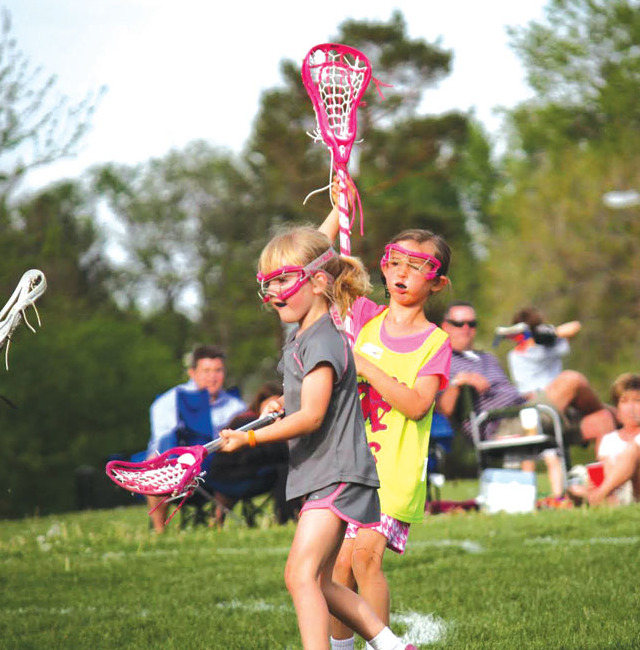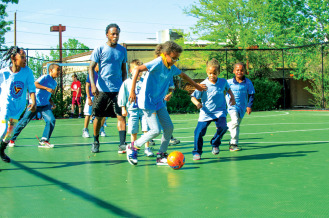Determining the right age for kids to start playing competitive sports can be a difficult choice, and now families face it even earlier. Most sports switch from recreational to competitive by age 8 or in third grade.
“I personally think it’s way too young, and not good for sports or kids,” says Kevin Druck, Stapleton resident and co-owner of Kinder Kixx, a private company that teaches kids the fundamentals of soccer in a “fun and positive environment.”
While Druck believes competitive sports at a young age are great for the small population of elite athletes, he says the majority of kids are just average at sports. These kids are squeezed out and don’t have the chance to play.

Druck has three boys who all play soccer, his oldest currently playing in a competitive Rapids league. This year he was bumped down to a lower level while his friends stayed on the higher-level team.
“When your kid gets in your car crying, you have a choice as a parent to say well, ‘screw the system, we hate them.’ But we don’t blame in our family. We said ‘OK, well, what do we learn from this?’”
As a coach and parent, he understands the many opinions over competitive sports. He thinks the answer is getting to know your kid and what’s right for him or her, as well as being willing to recognize sports may not be a realistic future. He also understands parents of stellar athletes want their kids to play at the highest level and sports are the priority. For his family, his priorities are character, education and then sports.
He’d like to start a recreational soccer league for older kids, but suspects there is no demand.
Competitive leagues contact him for team rankings of even his youngest players. He jokes he could start a competitive league for 2-year-olds, imagining kids running around in diapers. “From a financial aspect, I’m like ‘Well, let’s do it!’ There are people who would pay for it so it’d work, but does that mean it’s right?”
Mindy Solomon, Lowry resident and child psychologist at Children’s Hospital Colorado, says parents have to be intentional in how they talk to their kids about sports.
“These days it’s so tough to just allow kids to figure out who they are on their own timeline,” she says. “There’s so much pressure to figure out who they are right away.”
 Her 6-year-old daughter joined gymnastics this year for the first time and it’s clear she’s not as good as other kids who have been doing it since age 2 or 3. Her daughter is aware of this and has become discouraged from participating.
Her 6-year-old daughter joined gymnastics this year for the first time and it’s clear she’s not as good as other kids who have been doing it since age 2 or 3. Her daughter is aware of this and has become discouraged from participating.
Rejection is difficult for any brain to understand, but especially young brains, according to Solomon. Before age 11 or 12, abstract ideas are difficult to comprehend and rejection is especially confusing. A kid only knows, I wasn’t picked or I wasn’t good enough.
On the other hand, Solomon’s 4-year-old daughter shows signs of being exceptionally athletic, but Solomon doesn’t want to limit her experiences as a kid by putting her into a competitive league.
Unfortunately for kids who do go competitive at a very young age, there is a big “burnout” factor.
Eleven-year-old Stapleton resident Kelly Englert has been doing synchronized swimming for seven years. Up until this year, she has loved it but is now considering quitting. “I’m having a tough time with the coaches and sometimes I don’t feel as motivated to go to practice,” she says. Practices are 2.5 hours two times during the week and 3 hours on Saturday, from August to June.
Unlike her previous recreational team, her competitive team is “all work and no play.”
She says she is picked on by coaches and feels guilty for getting injured because there is so much pressure to perform well. “When they [coaches] talk to me like that it makes me be more difficult and prove a point, like if you’re going to be this way then I’m going to be this way. Stop hassling me.”
“Kelly has a really solid foundation to be really good if she wants to work that hard,” says her mom, Chris Englert, who has had several discussions with the coaches about Kelly’s performance. “If she doesn’t, I feel like there’s not a lot of options to go elsewhere.”
As a parent, she’s stumped whether to encourage Kelly to pursue another sport. If she were to quit, she may not be able to make a team for another sport because by age 11 most kids have already been playing competitively.
So, the discussion to quit persists. It has become an almost daily topic in the household. How has the switch from recreational to competitive worked in your family? The Front Porch welcomes comments.




0 Comments